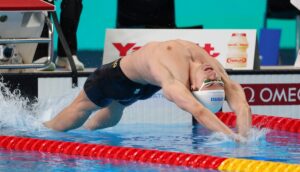On Tuesday at the U.S. Women’s Open at the Lancaster Country Club, Lexi Thompson announced that she was retiring from the LPGA Tour at the end of the season from full-time competition. In her 18th consecutive start in the championship, the 29-year-old Thompson is exiting just as Rose Zhang settles into her first full year as a professional. Thompson turned pro at 15 years old and won her first LPGA event just a year later, so she never amassed much of a resume in amateur golf. But Zhang racked up amateur trophies, including a U.S. Women’s Amateur, an NCAA individual Championship at Stanford and the Augusta National Women’s Amateur while spending a record 141 weeks as the top-ranked female amateur in the world.
Last June in her first event as professional, the Mizuho Americas Open, Zhang beat Jennifer Kupcho in a playoff to become the first woman to win her pro debut since 1951. Earlier this month, Zhang added a second win at the Cognizant Founders Cup. The women’s game is hurting for American superstars beyond Nelly Korda, who has won six of her last seven tournaments, and is the overwhelming favorite this week to earn her third major championship.
Yet the 21-year-old Zhang is as talented as anyone to challenge Korda for years to come for the top of the women’s game. But let’s give her some time to get used to professional golf before we label her as the next No. 1 player in the world and a future Hall of Famer. The teenage success of Thompson, Michelle Wie and Lydia Ko and so many other young women has led us to forget the speed at which things come at young players when they are suddenly thrust into the limelight. Zhang was a few years older than these women when she turned pro, but she’s still very inexperienced in the business of professional sports. Coming off of last year’s success, where she had a victory and four other top 10s in 14 starts, the Irvine, California, native, has momentum, but she will also likely endure the growing pains that come with life at the highest levels of professional sports. Becoming a great tour player is as much about assembling everything from the right equipment to the right caddie to right accountant to the right agent, as it is about playing tournament golf.
In 2022, Zhang signed with Callaway while still at Stanford. For young players, solidifying a formal relationship with a club and ball manufacturer has long been the most fundamental step toward life in professional golf. In 1996 when another former Stanford legend turned pro, Nike became an inseparable part of the lore that grew around his game. On TV commercials and playing Callaway’s ball and clubs, Zhang is linking herself with a giant in the golf industry. She’s also linking herself to Tiger Woods by signing with his agency, Excel Sports Management, where the 15-time major champion’s long-time agent, Mark Steinberg, is a partner.
But having confidence with your equipment and an agent that you can trust is just the on-ramp to success in tour golf. “Keep the main thing the main thing” is a popular mantra across sports—a focus on the on-field performance—but that’s easier said than done for most professional athletes.
“There’s a lot that I want to accomplish,” Zhang told Sports Illustrated. “But in order to do so I realized how important it is to manage my time, my team, and my presence in being able to play. So it’s more so focusing on just one thing at a time and allowing myself to be able to compete in the best way that I can.”
The LPGA Tour and women’s golf need Zhang to succeed as it attempts to grow its brand in a golf world currently fractured by the ongoing saga of the PGA Tour vs. LIV Golf. The pressure that Thompson must have felt—pulling her away from the game that she loved at the tender age of 29—is something that Zhang may contend with as she ascends.
“There’s a lot more coming at you,” Zhang says. And there’s a lot more noise surrounding you. So at least for me, it’s important for me to realize how I want to prioritize taking care of my body and health.”
During the offseason, she took on the role of a CEO, assembling those pieces of her team to form her own enterprise. She’s got a couple of years left to finish her degree at Stanford, and she’s similar the graduates coming out of the school to start lucrative careers as entrepreneurs in Silicon Valley. There are a lot of people not just counting on her to succeed, but looking for her to lead and make decisions that she’s never had to make in her life.
“For me the hardest thing has been building my team,” Zhang says. “When you’re coming out of college you have a profession and an obligation to make golf your career. I am essentially my own boss. Putting the right people around me to help me build myself to the best potential is very crucial.”
Zhang’s team includes a caddie, a swing coach, trainers, sports performance specialists, and a CPA to help her pay her taxes. To varying degrees, most current players have some semblance of this organization. The most fickle and unstable of these roles are the caddie and the swing coach: jobs that often last at the mercy of a player’s performance in tournaments, preferences and quirks. After working with George Pinnell for nearly decade, Zhang recently began seeing Todd Anderson, who has worked with several PGA Tour players, including Billy Horschel and Brandt Snedeker. Pinnell would always be her mentor, she said, but she needed an instructor who could meet her at events and help with the transition to the LPGA Tour.
No matter how many times Zhang heard other players discuss the challenges of being a professional athlete, she had to experience it for herself to fully appreciate the intricacies of the process. “These are things that I was able to understand early on, but I was never able to experiment on the whole process until I was actually in the thick of it,” she says. “This entire process takes a lot more brain work, but once I build myself around a great team and great people, that’s when I can really focus on what I have to do. I’ve received a lot of great advice from people and I’ve taken this into my own stride but it’s still all a very big learning process.”
For Zhang, a major part of that learning process is seeing where her game stacks up against other top players. Nelly Korda has emerged as perhaps the most dominant player in the women’s game, perhaps since Anika Sorenstam won 11 times in 2002. To win this week in the U.S. Women’s Open or any week for the foreseeable future, Zhang will have to beat Korda, who is still just 25 years old.
“I think there’s a lot of expectation in terms of how I should perform, but in my opinion. that’s all noise,” Zhang says. I definitely feel like I am capable of being at the top. But to get to that level it requires everything from a good team to a good practice and good preparation routine. And managing everything involved with the mental and physical side of golf. So I think I’m getting there.”
FARRELL EVANS
Evans has been a golf writer at Sports Illustrated and ESPN.com. He is the co-founder of two organizations in New York City that use the game of golf to serve underserved youth. He can be reached at: farrellevansgolf@gmail.com





